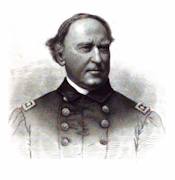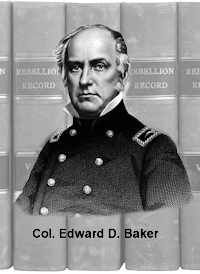March 19, 1862 (Ship Island)
 None of our vessels have yet arrived. I sent over to Biloxi yesterday, and robbed the post-office of a few papers. They speak volumes of discontent. It is no use—the cord is pulling tighter, and I hope I shall be able to tie it. God alone decides the contest; but we must put our shoulders to the wheel.
None of our vessels have yet arrived. I sent over to Biloxi yesterday, and robbed the post-office of a few papers. They speak volumes of discontent. It is no use—the cord is pulling tighter, and I hope I shall be able to tie it. God alone decides the contest; but we must put our shoulders to the wheel.
I see that Yancey has made a speech in New Orleans, the substance of which was that ‘all Europe wished to see was, the total destruction of this country.’ That was the truth, and what a comfort it must have been to him to think that he had been one of the greatest instruments in the consummation of their designs! He has returned home disgusted with England. His whole speech went to show the desperation of ‘the cause.’
You can better imagine my feelings at entering Hampton Roads as an enemy of Norfolk than I can. But, thank God, I had nothing to do with making it so.
March 19th. We hear to-night that the army is embarking at Alexandria for Yorktown, on the peninsula, and that operations against Richmond are to be carried on from that direction. Our command is to remain here until the rest of the army get out of the way. We are told that the change of base was decided upon on the 13th, at Fairfax Station, at a council of war, composed of corps commanders, and that the advance to Manassas was only made in response to the President’s urgent demands that the army open the campaign.
March 19th.—He who runs may read. Conscription means that we are in a tight place. This war was a volunteer business. To-morrow conscription begins—the dernier ressort. The President has remodeled his Cabinet, leaving Bragg for North Carolina. His War Minister is Randolph, of Virginia. A Union man par excellence, Watts, of Alabama, is Attorney-General. And now, too late by one year, when all the mechanics are in the army, Mallory begins to telegraph Captain Ingraham to build ships at any expense. We are locked in and can not get “the requisites for naval architecture,” says a magniloquent person.
Henry Frost says all hands wink at cotton going out. Why not send it out and buy ships ? “Every now and then there is a holocaust of cotton burning,” says the magniloquent. Conscription has waked the Rip Van Winkles. The streets of Columbia were never so crowded with men. To fight and to be made to fight are different things.
To my small wits, whenever people were persistent, united, and rose in their might, no general, however great, succeeded in subjugating them. Have we not swamps, forests, rivers, mountains—every natural barrier? The Carthaginians begged for peace because they were a luxurious people and could not endure the hardship of war, though the enemy suffered as sharply as they did! “Factions among themselves” is the rock on which we split. Now for the great soul who is to rise up and lead us. Why tarry his footsteps ?
March 19.—The bridge-builders captured by Morgan’s party, on the Louisville and Nashville Railroad, having been released, returned this evening to Louisville, Ky.
—At New-Orleans, Gen. Lovell, C.S.A., issued the following order:
“Hereafter no exemptions from military duty will be allowed permanently, except in the case of minors or persons physically unable to do service. Applications for the release of those engaged upon work for the government must be made to this department in the form of certificates from the owners or foremen of the shops, when an order will be issued to the commanding officer of the camp to which the applicant belongs to grant a furlough of a certain number of days, which can only be renewed by a subsequent certificate and order from these headquarters.”— Neva-Orleans Delta, April 4.
—The Ninety-seventh regiment of New-York Volunteers, under the command of Col. Charles Wheelock, passed through New-York City for the seat of war. Col. Wheelock, a wealthy and influential resident of Oneida County, who undertook the task of organizing the regiment, expended upward of nine thousand dollars out of his own pocket towards the support of the families of the men and for the advancement of the organization.—N. Y. Tribune, March 22.
 None of our vessels have yet arrived. I sent over to Biloxi yesterday, and robbed the post-office of a few papers. They speak volumes of discontent. It is no use—the cord is pulling tighter, and I hope I shall be able to tie it. God alone decides the contest; but we must put our shoulders to the wheel.
None of our vessels have yet arrived. I sent over to Biloxi yesterday, and robbed the post-office of a few papers. They speak volumes of discontent. It is no use—the cord is pulling tighter, and I hope I shall be able to tie it. God alone decides the contest; but we must put our shoulders to the wheel.



